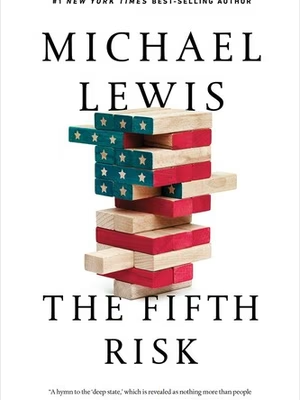Overview
In The Fifth Risk, Michael Lewis does what he does best: he finds a fascinating story hiding in plain sight. This time, he turns the 2016 presidential transition into a gripping look at how our government actually works and what happens when people stop paying attention to the boring, vital stuff. I like this book because it made me think differently about risks I don't even know exist.
Lewis follows career government employees at agencies like the Department of Energy, the Department of Agriculture, and the Department of Commerce. These are not politicians chasing headlines but quiet experts who manage things like nuclear weapons, weather forecasts, and food safety. When a new administration refuses to show up and learn what these people do, the risks get scary fast.
My Take: The "What Am I Not Worrying About?" Exercise
Most summaries treat this as a political book about the Trump transition and stop there. I wanted to turn it into a personal risk detector you can use in your own life. As you read, I'll keep asking, "What invisible work are you ignoring?" and "What quiet risks are you not even thinking about?"
I treat this book like a reminder to run a simple exercise I call "What am I not worrying about?" Once a month, I pause and ask myself: What boring, unglamorous stuff keeps my life running smoothly? Who does invisible work that I take for granted? What systems would fall apart if I stopped maintaining them? Lewis shows that the fifth risk is the one you never saw coming because you weren't even looking.
Key Takeaways
The Fifth Risk Is the One You're Ignoring
For me, the big idea is that the fifth risk is "project management," the risk that nobody is managing all the other risks. Lewis shows how governments, businesses, and people get blindsided not by the dangers they know about, but by the ones they never bothered to understand. It is a wake-up call to ask, "What am I assuming will just work?"
Government Does More Than You Think
I never realized how much invisible, unglamorous work the government does until I read this book. Things like nuclear safety, food inspections, weather data, and disaster relief don't run themselves. Lewis introduces us to career employees who spend decades perfecting systems that most of us never think about until they break.
Transitions Matter
The book opened my eyes to how important knowledge transfer is. When a new team refuses to show up and learn from the old team, institutional knowledge disappears and risks multiply. This is true in government, but also in companies, families, and any system where people come and go.
Data and Science Are Not Partisan
Lewis shows that when we treat data collection and scientific research as political issues, we sabotage our own safety. Weather forecasts, crop data, and nuclear monitoring are not liberal or conservative ideas, they are tools that help everyone make better decisions.
Boring Work Can Be Heroic
The people Lewis profiles are not celebrities or politicians. They are scientists, administrators, and managers who do boring, meticulous work that saves lives and keeps society running. The book reminded me to appreciate the quiet experts in my own life and to value competence over charisma.
Chapter-by-Chapter Summary (Short & Simple)
Chapter 1: The Shepherd's Warning
Lewis starts at the Department of Energy, which most people think is about oil and gas but is actually in charge of America's nuclear weapons and nuclear waste. He follows the outgoing staff who prepared detailed briefings for the incoming Trump team, who mostly never showed up. The career employees were alarmed because nuclear security is not something you can figure out on the fly.
Chapter 2: People Risk
This chapter digs into the Department of Agriculture, which manages everything from food stamps to forest fires to meat inspections. Lewis profiles people who spent their careers building systems to feed hungry kids and keep rural America safe. When the new administration ignored their warnings and cut their budgets, the risks got real for millions of families who depend on these quiet programs.
Chapter 3: All the President's Data
The final chapter focuses on the Department of Commerce, home to NOAA and the National Weather Service. Lewis explains how accurate weather forecasts save lives, guide farmers, and power entire industries. When political appointees tried to privatize or suppress this data, they put public safety and economic stability at risk, all because they didn't understand what they were breaking.
Main Concepts
The Five Risks
At one point in the book, Lewis asks a Department of Energy official to list the top five risks the department manages. The first four are things like nuclear weapons accidents, nuclear waste storage, North Korea, and Iran. The fifth risk, which the official calls "project management," is the risk that nobody is paying attention to the first four risks anymore.
I love this framework because it applies to everything. In my life, the fifth risk might be "assuming my health, relationships, or career will just work out" without doing the boring maintenance work. Lewis shows that the scariest risks are often the ones we don't put on our lists at all.
Institutional Knowledge
One of the book's big themes is how much knowledge lives inside the heads of career employees. These are people who spent 20 or 30 years learning how a system works, where the weak spots are, and how to prevent disasters. When a new team refuses to meet with them, all that invisible expertise disappears overnight.
I started thinking about this in my own work. When someone leaves my team, do we capture what they know, or do we just assume the next person will figure it out? Lewis argues that transitions are where systems are most vulnerable, and I see that everywhere now.
The Value of Boring Competence
Lewis profiles scientists and administrators who are not trying to be famous. They just want to do their jobs well and keep people safe. The book celebrates quiet competence over loud confidence, and it made me rethink who I admire and why.
How to Apply the Ideas This Week
I don't want this to be just another political book you read and forget. Here are a few small, practical ways I use the ideas from The Fifth Risk in my own life. You can try them this week and see what changes for you.
- Run a "What am I not worrying about?" audit. Set aside 20 minutes and make a list of systems, habits, or relationships you take for granted. Ask yourself, "What invisible work keeps this running smoothly?" and "What would happen if I stopped maintaining it?"
- Thank someone who does invisible work. This week, find one person in your life who does boring, unglamorous work that makes your life easier, maybe a coworker who manages schedules, a parent who handles logistics, or a friend who quietly keeps the group together. Tell them you see their work and appreciate it.
- Document one thing before it breaks. Pick one system in your life or work that only you know how to manage. Write down how it works so someone else could maintain it if you were gone tomorrow. This is your own small knowledge transfer.
- Ask better questions when someone new arrives. The next time you start a new project, job, or role, treat the first few weeks like the transition period Lewis describes. Ask the people who were there before you, "What should I know that isn't obvious?" and "What risks am I not thinking about yet?"
Memorable Quotes
"The fifth risk is the risk a society runs when it falls into the habit of responding to long-term risks with short-term solutions."
"Managing the thing was the thing."
"The people who might have told the story of the work they did never really bothered to do it. They just went about their business."
"It's the stuff you're not paying attention to that gets you."
Who I Think Should Read This Book
- Anyone interested in how government works: If you want to understand what government agencies actually do beyond the headlines, this book gives you a clear, human look inside.
- Managers and leaders: If you run a team or organization, the lessons about transitions, institutional knowledge, and invisible work will help you avoid costly mistakes.
- People who value competence: If you believe quiet expertise matters more than loud confidence, you will love the people Lewis profiles in this book.
- Citizens who vote: If you care about policy and want to make informed decisions, this book shows you what is at stake when we ignore the boring parts of government.
- Anyone working on long-term projects: If you are building something that takes years to complete, the book's warnings about short-term thinking and risk management will feel very real.
What Other Readers Are Saying
I always like to see what other readers think before I commit to a book. On Goodreads, The Fifth Risk has a rating of around 4.0 out of 5 stars from over 47,000 ratings. Many readers say the book is eye-opening and makes them appreciate the work of career government employees. Some wish it were longer, but most agree it packs a lot of insight into a short read.
On Amazon, the book holds a rating of around 4.4 out of 5 stars. Reviews often call it "important," "well-written," and "a must-read for anyone who cares about how government works." A few readers feel the political angle is heavy-handed, but even many of them still say the stories and people are fascinating.
-
Read reviews on Amazon:
The Fifth Risk by Michael Lewis on Amazon
* Affiliate link. I earn from qualifying purchases.
- Read reviews on Goodreads: The Fifth Risk on Goodreads
Final Thoughts
For me, the biggest gift of The Fifth Risk is that it taught me to notice invisible work. I started asking, "What am I taking for granted?" and "Who is quietly keeping this system running?" That shift helps me appreciate competence, prepare for transitions, and spot risks I wasn't even thinking about before.
If you use this summary as a personal risk detector, a "What am I not worrying about?" exercise, you'll walk away with more than just a story about government. You'll have a lens for seeing the quiet work that holds your life, your team, and your community together. That's the heart of Lewis's message: the scariest risk is the one you never saw coming because you weren't looking.
Ready to Spot Your Hidden Risks?
If this summary helped you, the full book is worth reading slowly, with a pen in your hand and your own blind spots in mind. You can use it as a guide to start noticing the invisible work that keeps your world running.
Get The Fifth Risk on Amazon* Affiliate link. I earn from qualifying purchases.

